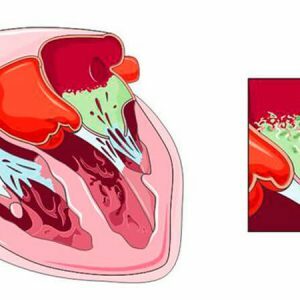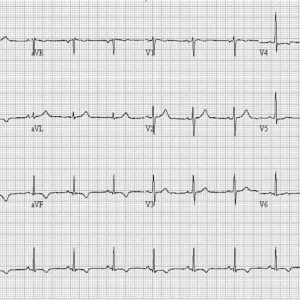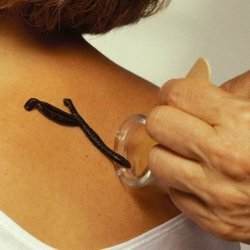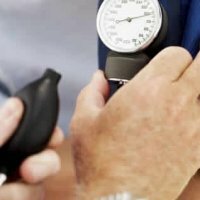Endocarditis: symptoms and treatment

Inflammation of the inner shell of the heart, which is characterized by damage to the valve apparatus and the layer of cells lining the surface of adjacent vessels, is classified as endocarditis in medicine.Often doctors note that the pathological process under consideration is not an independent disease, but is a consequence of other diseases.Endocarditis can develop at any age, potential sources of this inflammatory process are considered almost 128 different microorganisms.
Complete classification of endocarditis involves the division of the disease into the following types:
- rheumatic;
- infectious acute;
- Leffler endocarditis( parietal fibroplastic eosinophilic);
- is chronic or subacute;
- thromboendocarditis of non-infectious etiology.
Symptoms of endocarditis
The inflammatory process in question can occur completely suddenly, or it may be completely asymptomatic for a long time.In addition, endocarditis is characterized by a variety of manifestations, to have acute or prolonged course - all these features make diagnosis difficult.

Usually, the clinical picture develops as much as possible within two weeks from the moment of infection.The most important symptom of endocarditis is fever, which is accompanied by intense chills, increased sweating.It is noteworthy that this inflammatory process is characterized by a variable temperature reaction of the body - the patient can complain about subfebrile body temperature for several months, or for sudden jumps of increase / decrease / normalization of this indicator.
If the clinical picture is detailed, complete, the following symptoms will occur for endocarditis:
- changes in the skin - they become pale yellow, small-dotted hemorrhages appear on the mucous membranes and skin, there are spots on the palms,Trunk and feet;
- marked pathological lesions of the kidneys - a kidney infarction or focal nephritis is diagnosed;
- marked intoxication - a constant headache, fatigue, weakness;
- pathological lesion of the mitral or aortic valve;
- changes in terminal phalanges and nail plates;
- pathological lesions of the central nervous system - thromboembolism of cerebral vessels, psychosis, meningoencephalitis;
- arthritis of large joints of the upper and / or lower limbs;
- progressive heart failure;
- significant increase in lymph nodes.
Note: The clinical picture, the nature of the course of endocarditis and the prognosis of the disease depend on the state of the immune system of the individual patient and the severity of the process.
Diagnostic measures
Often, a doctor can diagnose a patient with a complaint - a fever with chills.Of course, the specialist will certainly conduct a complete examination of the patient and if there are thromboembolic complications, myocardial murmurings and positive results of bacteriological research, they simply confirm the previously diagnosed diagnosis.
A patient with endocarditis( or only if suspected) undergoes an electrocardiogram - signs of left ventricular or right hypertrophy, conduction abnormality, ventricular or atrial extrasystole will be revealed.Much less often when conducting an electrocardiogram the doctor notes atrial fibrillation or flutter.
 Note: is an electrocardiogram that allows you to diagnose endocarditis at the earliest stages of progression, which guarantees successful treatment.
Note: is an electrocardiogram that allows you to diagnose endocarditis at the earliest stages of progression, which guarantees successful treatment.
Echocardiography is recommended for those patients whose doctors suspect the development of endocarditis of infectious origin.This method of examination allows you to objectively assess the condition of the valve apparatus and promptly detect calcification or rupture of the valve leaflet.Often, echocardiography is used to clarify the nature of the heart defect, as well as to determine the appropriateness of an operative intervention.
Sufficiently informative in the diagnosis of the inflammatory process under consideration are blood tests - general, biochemical and immunological.A general( clinical) blood test will show anemia and a shift of the leukocyte formula to the left, a significant increase in ESR will serve as a hallmark of endocarditis.A biochemical study of the patient's blood reveals the presence of C-reactive protein, a decrease in the level of albumins and an increase in the amount of fibrinogen.Immunological analysis of blood helps to detect rheumatoid factor and elevated level of the components of the compliment.
It is essential that blood tests for sterility are carried out as part of diagnostic activities, and this is the most important stage in the examination of a patient with suspected infectious origin of endocarditis. In carrying out such a study, it is very important to follow the technique of blood sampling, and to obtain a truly reliable result, experts recommend conducting such an analysis at least two times in a row.
Endocarditis treatment
This process is often difficult because it is not immediately possible to diagnose a diagnosis quickly, in time to detect a pathology.Therefore, in this article we will outline only the main directions of therapy for endocarditis:
Antibacterial therapy
The treatment uses bactericidal drugs in high doses, they are administered by intravenous drip infusion.Often, doctors note the lack of effectiveness in the use of a particular drug and in this case they carry out a change in treatment tactics.
The choice of a specific antibacterial drug for the treatment of the inflammatory process under consideration is strictly individualized, and the causative agent of the disease is the main indicator in this choice.For example, gentamicin, benzylpenicillin or amikacin intramuscularly, semi-synthetic penicillins in combination with cephalosporins or aminoglycosides can be used in therapy.High efficacy in the treatment of endocarditis are vancomycin and fluoroquinolones.
Note: is the main condition for the effective treatment of the inflammatory disease in question with antibacterial drugs, which is the continuity and observance of the prescribed duration of treatment.
Immunocorrection
Doctors use passive immunization to neutralize microbial toxins circulating in the bloodstream with ready-made antitoxic sera.The most effective is hyperimmune plasma in combination with human immunoglobulin - they are administered intravenously every day for 5 days.
Surgical treatment
If conservative treatment of the disease in question does not yield positive results, then doctors will decide whether to perform the surgical procedure. Indications for such cardinal treatment are the development of the following complications of endocarditis:
- arterial thromboembolism;
- progressive heart failure;
- myocardial infarction.
Endocarditis in childhood
Infection endocarditis is diagnosed most often in childhood. The symptomatology of this pathological process will be as follows:
- Acute Toxicosis;
- Inflammation of the endocardium;
- occlusion of blood vessels by thrombus.
Children are most often affected by aortic and mitral valves and this is observed in the primary inflammatory process.If the child is progressing with secondary bacterial endocarditis, the inner shell of the heart is directly affected.
The symptoms and nature of the current inflammatory disease in children are identical to those seen in adults .The only thing that can be noted as a feature of pediatric endocarditis is a severe pathological lesion of many internal organs, which is accompanied by intense cardiac, hepatic or renal insufficiency.
Diagnostic measures for the detection of pediatric endocarditis are reduced to the analysis of blood and urine, electrocardiograms and sowing pathogens.
Treatment of the inflammatory disease in question, diagnosed in a pediatric patient, amounts to the use of large doses of penicillins, possibly its combination with gentamycin.It is worth remembering that even for adult patients the dosage and duration of treatment are determined individually, and even of children it is not necessary to speak - only a specialist can give effective and safe appointments.
Endocarditis is a complex disease, it requires long-term treatment and is often aggravated by various complications.Doctors insist that patients of clinics and outpatient departments of medical institutions regularly undergo examinations at the cardiologist - an experienced specialist even on the basis of the results of elementary examinations will be able to suspect the patient of the disease in question.And such early diagnosis is the key to successful treatment.
Tsygankova Yana Aleksandrovna, medical reviewer, therapist of the highest qualification category



